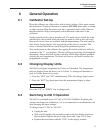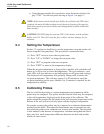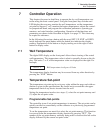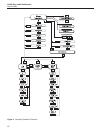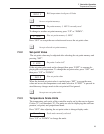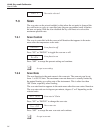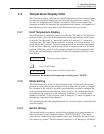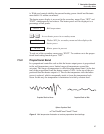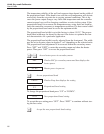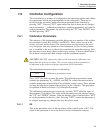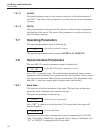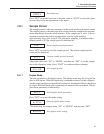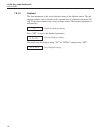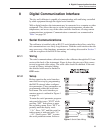
sistor. The calibrator measures the voltage at the red terminal and interprets
+5V as open and 0V as closed.
7.4.4 Switch Test Example
This section describes a possible application for the temperature hold feature
and how the instrument is set up and operated.
Suppose you have a thermal switch which is supposed to open at about 75°C
and close at about 50°C and you want to test the switch to see how accurate and
repeatable it is. You can use the temperature hold feature and the scan function
to test the switch. Measurements can be made by observing the display or, pref
-
erably, by collecting data using a computer connected to the RS-232 port. To
set up the test do the following steps.
1. Connect the switch wires to the terminals on the front of the dry-well and
place the switch in the well.
2. Enable set-point scanning by setting the scan to “ON” in the primary menu
(see section 7.3.1).
3. Set the scan rate to a low value, say 1.0°C/min. (see section 7.3.2). If the
scan rate is too high you may lose accuracy because of transient temperature
gradients. If the scan rate is too low the duration of the test may be longer than
is necessary. You may need to experiment to find the best scan rate.
4. Set the first program set-point to a value below the expected lower switch
temperature, say 40°C, in the program menu.
5. Set the second program set-point to a value above the expected upper switch
temperature, say 90°C.
6. Set the program soak time to allow enough time to collect a number of data
points, say 2 minutes.
7. Collect data on a computer connected to the RS-232 port. Refer to Section 8
for instructions on configuring the RS-232 communications interface.
7.5 Secondary Menu
Functions which are used less often are accessed within the secondary menu.
The secondary menu is accessed by pressing “SET” and “EXIT” simulta
-
neously and then releasing. The first function in the secondary menu is the
heater power display. (See Figure 4.)
7.5.1 Heater Power
The temperature controller controls the temperature of the well by pulsing the
heater on and off. The total power being applied to the heater is determined by
the duty cycle or the ratio of heater on time to the pulse cycle time. By knowing
the amount of heating the user can tell if the calibrator is heating up to the
set-point, cooling down, or controlling at a constant temperature. Monitoring
the percent heater power will let the user know how stable the well temperature
9140 Dry-well Calibrator
User’s Guide
26



